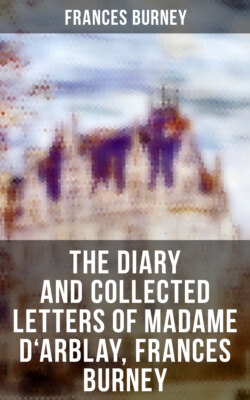Читать книгу The Diary and Collected Letters of Madame D'Arblay, Frances Burney - Frances Burney - Страница 125
На сайте Литреса книга снята с продажи.
George III. On Plays and Players
ОглавлениеSome time afterwards, the king said he found by the newspapers, that Mrs. Clive167 was dead.
Do you read the newspapers? thought I. O, king! you must then have the most unvexing temper in the world, not to run wild.
This led on to more players. He was sorry, he said, for Henderson,168 and the more as Mrs. Siddons had wished to have him play at the same house with herself. Then Mrs. Siddons took her turn, and with the warmest praise.
“I am an enthusiast for her,” cried the king, “quite an enthusiast, I think there was never any player in my time so excellent—not Garrick himself—I own it!”
Then, coming close to me, who was silent, he said,—“What? what?”—meaning, what say you? But I still said nothing; I could not concur where I thought so differently, and to enter into an argument was quite impossible; for every little thing I said, the king listened to with an eagerness that made me always ashamed of its insignificancy. And, indeed, but for that I should have talked to him with much greater fluency, as well as ease.
From players he went to plays, and complained of the great want of good modern comedies, and of the extreme immorality of most of the old ones.
“And they pretend,” cried he, “to mend them; but it is not possible. Do you think it is?—what?”
“No, sir, not often, I believe;—the fault, commonly, lies in the very foundation.”
“Yes, or they might mend the mere speeches—but the characters are all bad from the beginning to the end.”
Then he specified several; but I had read none of them, and consequently could say nothing about the matter—till, at last, he came to Shakspeare.
“Was there ever,” cried he, “such stuff as great part of Shakspeare only one must not say so! But what think you?—What?—Is there not sad stuff? what?—what?”
“Yes, indeed, I think so, sir, though mixed with such excellences, that——”
“O!” cried he, laughing good-humouredly, “I know it is not to be said! but it’s true. Only it’s Shakspeare, and nobody dare abuse him.”
Then he enumerated many of the characters and parts of plays that he objected to—and when he had run them over, finished with again laughing, and exclaiming,
“But one should be stoned for saying so!”
“Madame de Genlis, sir,” said I, “had taken such an impression of the English theatre, that she told me she thought no woman ought to go to any of our comedies.”
This, which, indeed, is a very overstrained censure of our dramas, made him draw back, and vindicate the stage from a sentence so severe; which, however, she had pronounced to me, as if she looked upon it to be an opinion in which I should join as a thing past dispute.
The king approved such a denunciation no more than his little subject; and he vindicated the stage from so hard an aspersion, with a warmth not wholly free from indignation.
This led on to a good deal more dramatic criticism; but what was said was too little followed up to be remembered for writing. His majesty stayed near two hours, and then wished Mrs. Delany good night, and having given me a bow, shut the door himself, to prevent Mrs. Delany, or even me, from attending him out, and, with only Miss Port to wait upon him, put on his own great coat in the passage, and walked away to the lower Lodge, to see the Princess Elizabeth, without carriage or attendant. He is a pattern of modest, but manly superiority to rank. I should say more of this evening, and of the king, with whose unaffected conversation and unassuming port and manner I was charmed, but that I have another meeting to write,—a long, and, to me, very delightful private conference with the queen. It happened the very next morning.
